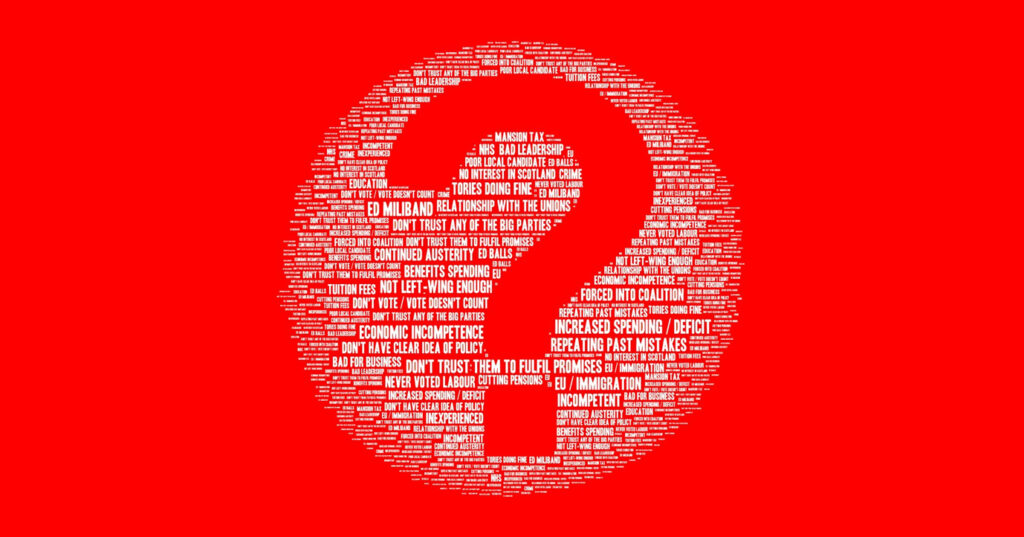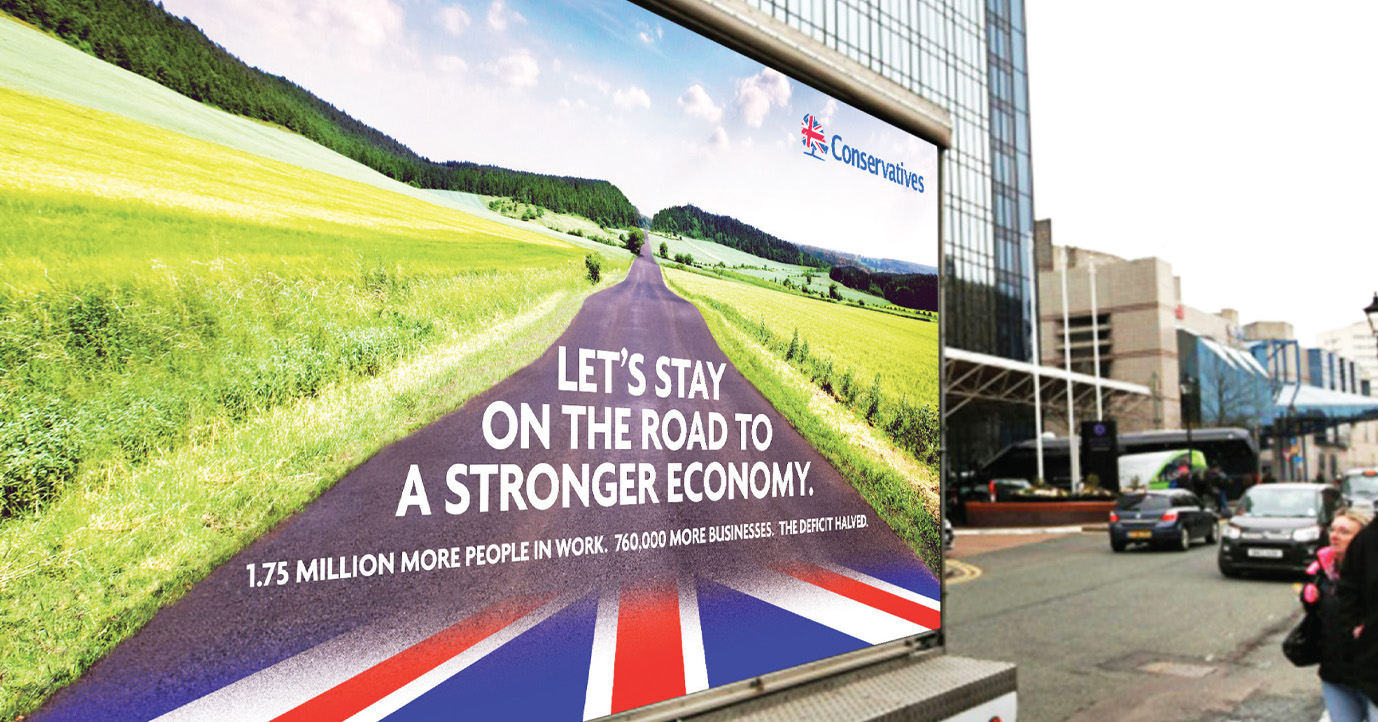
My focus groups with undecided voters this week took place in Thurrock and Brentford. Despite the parties’ frenetic activity since the start of the year, for some of our participants the real action seemed hardly to have started: “It feels like the start of a boxing match where they strut round the ring bigging themselves up”. Local street campaigners are out in force, however. While some in the groups confessed to peeking from upstairs curtains to avoid opening the door to a canvasser, there was still an appetite for the traditional doorstep conversation: “You can send me bits of paper all you like, but I’ve got questions. You can’t ask a piece of paper questions. Knock on my door!”
**********
There were complaints, as ever, that coverage of the campaign was still dominated by process stories rather than anything they felt could help them towards a decision: “The thing I find frustrating is that all the talk is about whether he’s going to do a third term and who is going to turn up to the debates. I don’t care about all that, I want to know who I’m voting for.” Even so, some issues had begun to get through. The Conservatives had been heard on the economy, help for first time buyers and the deficit (although “they never you how well we’re doing. Every now and then you get a statement from the bank manager saying ‘you’ve paid this much off, well done’, but with the deficit they bamboozle you and don’t say it in plain English”); Labour on zero-hours contracts, raising the minimum wage, the NHS, and wanting “to put more money into everything. But if they’re asked how they’re going to do it they just say ‘Tory cuts!’ I don’t know how they are going to put more into public services and cut the deficit.”
**********
Some had noticed the letter from one hundreds business leaders supporting Conservative economic policies, and rather fewer had heard about Labour’s FT ad quoting business support for staying in the EU (which most seemed to think an odd priority to launch their campaign with). A few thought business endorsements lent extra credibility to the government, but more often the discussion led back to the question of who was benefiting from the economic recovery and the policies that gave rise to it (if any: several felt that since the country had been emerging from financial crisis and recession, it would have been going some to make things any worse). People were still finding things hard – “utility bills are horrendous. If they’ve gone down I haven’t noticed” – and if anyone was better off it was probably people at the top end, such as those who might sign business leaders’ letters to the Telegraph. The “hat-trick of good news” on GDP, disposable income and consumer confidence received the same downbeat reception from most: “I just feel nothing has changed for years.”
**********
David Cameron’s video setting out the choice to be made at the election – a condensed version of his statement in Downing Street on the dissolution of parliament – was given much the same reaction, especially on the claim that the country was growing strongly and getting back to work (“a lot of them are zero hours, or part time, or minimum wage, not careers”). The attempt to frame the choice as between himself and Miliband also underlined how sensitive people are to anything that sounds remotely like an attack and how quickly it can obscure more positive parts of the message (“they always degrade other parties rather than talk about what they’re going to do”). There was also resistance to the idea of a straightforward choice: “He says it’s between the two parties but it’s not actually. Like it or not UKIP and the SNP are there and they might have an impact on the outcome”.
The Labour broadcast starring Martin Freeman brought a starkly different response in our two locations. To the Brentford group the message sounded “warm”, “genuine”, “heartfelt” (“apart from when he was talking about what the Conservatives would do; that felt a bit speculative”), and those already more sympathetic to Labour responded to what they heard as the appeal to social conscience. But the theme of contrasting values cut less ice in Thurrock: “It’s all well and good to say we’re nice people and we care about you more, but I want someone who can sort out the country”. It failed to answer the doubts people had about Labour: “He doesn’t tell you where they’re going to make cuts. If they’re going to do the things he said, where’s the money coming from?”; “I just think about last time they were in and made a mess of it.” For some, the fact that Freeman was fronting the film told its own story: “Ed Miliband wouldn’t do it because he couldn’t carry it off, because he’s not believable”. Some also had trouble suspending their disbelief: “He’s a very, very good actor. It’s just another role to him”.
**********
People in both venues debated the Miliband factor. Most agreed that he would line up less well against Obama, Merkel and Putin than Cameron does. Does it matter to have someone who can hold their own on the international stage? Less so, perhaps not surprisingly, to those already leaning most towards Labour (as one put it, “it would be nice, but it’s not a deal breaker”).
Some also thought Miliband was starting to make a better impression in his media appearances, and had done well in the non-debate, even though the interview had unfairly “spent five minutes talking about his brother” (a perfect piece of voter contrariness, incidentally: ask people what they think of Ed, and as often as not someone will still say “they chose the wrong Miliband”.)
**********
Several people in both constituencies spontaneously said they were worried about “a Labour administration under the fist of the Scottish MPs”. They were annoyed that the SNP should be in a position to determine the shape of the government (“they didn’t want anything to do with it, they wanted independence, and now they want to say what goes on”) and troubled by the potential consequences: “They don’t like us. How much more money are we going to have to push up north? They’re not for our interests.” Yet the prospect would be unlikely to change their vote. Those leaning towards Labour wanted a Labour government, or at least a change from the Tories; they would simply have to vote Labour and hope enough others did the same.
**********
The UKIP campaign was clearly making itself felt in Thurrock, more so than the other parties’: “Tim Aker is all about local issues. I must get something from them three or four times a week”. One also reported that the party’s message was an inversion of the usual Tory appeal: “The UKIP leaflets say a vote for the Conservatives in Thurrock would let Labour in”. Though many of our participants were seriously considering voting UKIP, their concerns echoed those heard elsewhere: “all I can tell you is that they want the immigrants out. What’s their policy on the NHS?”
At first glance, the UKIP pledge card was appealing (“Say no to the EU; Control our borders; Extra £3 billion for the NHS; Cut foreign aid spending; No tax on minimum wage”), and seemed a refreshing contrast with what they were hearing from elsewhere: “If they stick to it that’s exactly what we want to hear. We’re not going to hear that from Labour.” But for all the dislike of politicians’ caveats and evasions, some found this a bit to simplistic to be credible: “It sounds great but it’s like when you read an ad and look for the small print. There is no small print, that’s the worry”.
But those who would end up voting for UKIP would not be looking for a full programme for government but a way of making themselves heard. Often these individuals were wrestling with a dilemma that they did not expect to solve before 7 May: “A vote for UKIP would be a drop in a very big ocean, but I want to give a kick up the backside to the main parties. The Conservatives are better at housekeeping, but I don’t feel I’m going to get listened to. I don’t think I will decide until the day, and I think a lot of people think like that.”
**********
Part of the problem for them was that, as we have heard elsewhere, many think the parties and leaders seem to have more in common with each other than any of them does with people like themselves. Asked what they thought David Cameron would do on an evening out, the answers were predictable enough: somewhere “flash but discreet” for fois gras and chateaubriand with expensive wine poured from a decanter. So what about Ed Miliband? “Exactly the same. They haven’t grafted. They’ve been lucky, privileged. They’re all public school boys”. Miliband went to a comprehensive, as it happens. “Did he really? Well, he’s a millionaire. I imagine his family has got money.”
Others struggled with the idea of Miliband going out to enjoy himself: “I can’t imagine him in a pub. He doesn’t strike me as someone who ever goes out or has the slightest bit of fun, ever.” How about Nick Clegg? “He has to stay at home. His wife won’t let him out because he has to do the dishes. She’s super-fierce.” Nevertheless he was “the most normal, as much as they can be”, and the one of the four that people would most like to spend the evening with. Nigel Farage, if not in his usual pub, would go “to Brick Lane for a curry. But he won’t tell anyone.”


